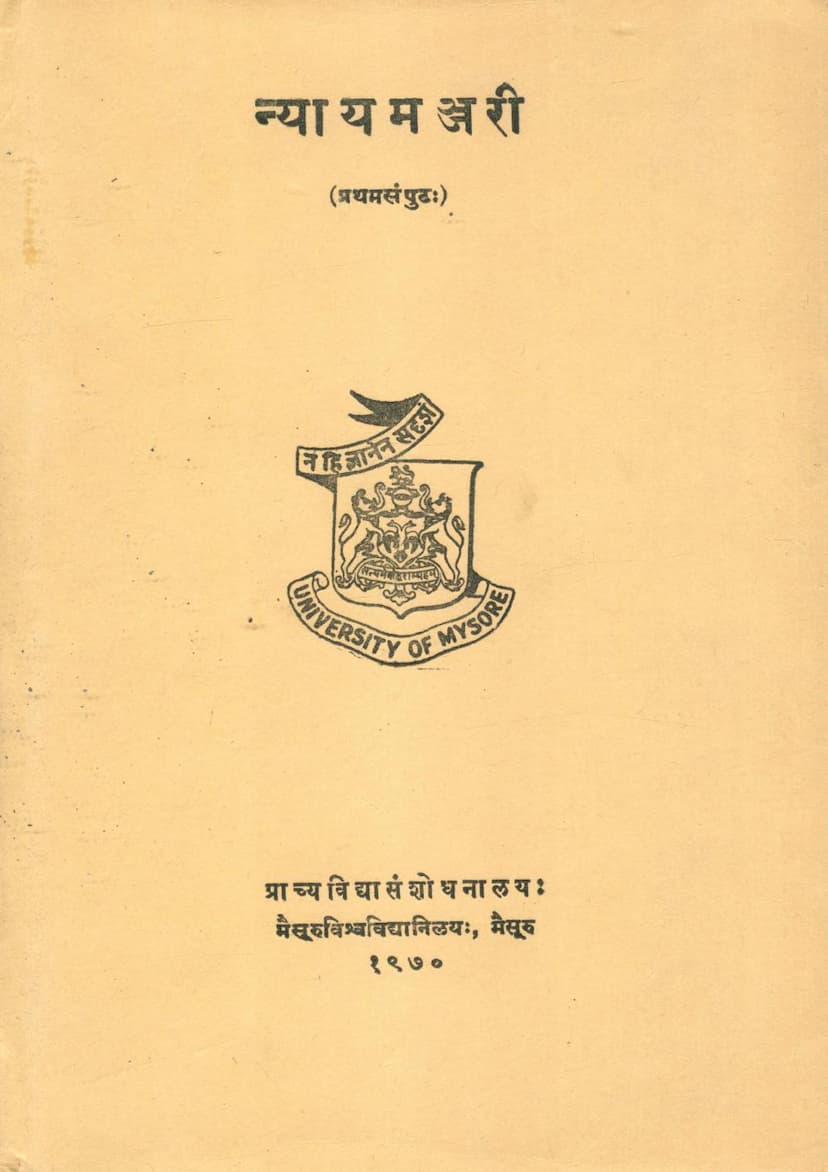Nyayamanjari Part 01
Added to library: September 2, 2025

Summary
Here's a comprehensive summary of the Jain text "Nyayamanjari Part 01" by K. S. Vardacharya, based on the provided catalog link and page content:
Book Title: Nyayamanjari Part 01 Author(s): K. S. Vardacharya (Editor) Publisher: Oriental Research Institute, University of Mysore Publication Year: 1969 Series: Oriental Research Institute Series No. 116
Overview:
"Nyayamanjari Part 01" is a critically edited volume of Jayantabhatta's seminal work on Nyaya philosophy, the Nyāyamañjarī. This edition, published by the Oriental Research Institute, University of Mysore, under the editorship of Vidvan K. S. Varadacharya, aims to provide a more accurate and comprehensive understanding of Jayantabhatta's important contribution to Indian philosophical discourse.
Context and Significance:
Jayantabhatta is recognized as an "intellectual titan" of Nyaya Philosophy, standing alongside prominent figures like Dharmakirti, Kumarila, and Vachaspatimisra. His work, Nyāyamañjarī, is considered a masterpiece that occupies an "extraordinary position" not only within Nyaya but also within the broader landscape of Sanskrit philosophical literature. The preface highlights that previous editions published in the Vijayanagaram Sanskrit Series (1895) and the Chowkhamba Sanskrit Series (1936) were insufficient for students of Nyaya, prompting this new critical edition.
Editorial Approach and Content:
-
Critical Edition: The present edition is a critical one, based on a comparative study of several manuscripts. This includes manuscripts acquired by the Oriental Research Institute, Mysore, and one kindly lent by the late Mahavidwan Atmakur Dikshacharya. The editor utilized a comparative method, analyzing these manuscripts alongside the previously printed texts.
-
Manuscript Value: The manuscripts used were found to contain "unknown passages" that are highly valuable for clarifying "doubtful points" in Nyaya Philosophy. This suggests that the edition offers new insights and interpretations derived from primary source material.
-
Tippani-Nyayasaurabha: A "brief tippani" (commentary) titled Nyāyasaurabha has been provided by the editor, K. S. Varadacharya, to clarify "difficult points" and provide a "clear understanding" of the text, as requested by scholars.
-
Structure: The book is divided into Āhnikas (chapters), with Part 01 focusing on:
- First Āhnika: Deals with Pramāṇa-sāmānya-parīkṣā (General Examination of Means of Knowledge). This extensive section covers the introduction, the importance of scriptures, the fourteen branches of knowledge, the place of Nyaya and Ānvīkṣikī (logic/reasoning), the definition of Vidyāsthāna (place of knowledge), an explanation of the Uddesa-sūtra (enumeration of categories), a detailed discussion of the sixteen padārthas (categories of Nyaya), and a general examination of Pramāṇa (means of valid cognition). This section delves into various philosophical viewpoints on perception, inference, comparison, and testimony, critically analyzing Buddhist, Mimamsaka, and other schools of thought.
- Second Āhnika: Focuses on Pratyakṣādi-parīkṣā (Examination of Perception and other Means of Knowledge), including detailed discussions on perception (pratyakṣa), inference (anumāna), comparison (upamāna), and testimony (śabda).
- Third Āhnika: Covers Śabda-parīkṣā (Examination of Testimony), including discussions on the nature of words, the authority of Vedic texts, the concept of Īśvara (God), and the validity of Agamas.
- Fourth Āhnika: Continues the examination of Śabda (Testimony) and related concepts, including the eternality of sound, the nature of Veda, and the refutation of various arguments against divine authorship or eternal validity.
Author and Heritage of Jayantabhatta:
The preface provides biographical details about Jayantabhatta, tracing his lineage back to his great-grandfather, Shaktisvamin, who was a minister in Kashmir. Jayantabhatta himself was a staunch believer in the Vedas, a versatile scholar in Karmamimamsa, and bore the title Vṛttikāra (commentator on Nyaya). He was also a devotee of Shiva. The text suggests that Jayantabhatta lived in the early 10th century AD, based on his acquaintance with Anandavardhana's Dhvani theory and his mention of Shakaravarman of Kashmir. Notably, while other prominent philosophers received royal patronage, Jayantabhatta wrote Nyāyamañjarī as a diversion while imprisoned by a "royal despot."
Key Themes Explored (Based on Āhnika Breakdown):
- Epistemology (Pramāṇa): The core of the work lies in its detailed analysis of the means of valid knowledge, including:
- Perception (Pratyakṣa): Defining its nature, the role of senses, sensory contact (indriyārthasannikarṣa), and refuting opposing views.
- Inference (Anumāna): Examining the structure of inference, the nature of the hetu (reason), fallacies (hetvābhāsa), and the concept of vyāpti (invariable concomitance).
- Comparison (Upamāna): Discussing the function and validity of comparison.
- Testimony (Śabda): Analyzing the nature of words, the concept of an āpta (reliable source), and the authority of Vedic statements.
- Metaphysics and Logic: The text delves into fundamental Nyaya categories like pramāṇa, prameya (knowable objects), saṁśaya (doubt), pramāna (proofs), tarka (reasoning), vāda (debate), jālpa (cavil), vitanda (refutation), and nigrahasthāna (grounds for defeat).
- Critique of Other Schools: A significant portion of the work involves the critical examination and refutation of arguments from other philosophical traditions, particularly Buddhism (e.g., refuting their views on perception, inference, and the nature of reality), Mimamsa, and Sankhya.
- The Nature of Reality: Jayantabhatta's work explores the fundamental nature of reality, the self (ātman), consciousness, and the relationship between the knower, the known, and the means of knowing.
- The Goal of Knowledge (Mokṣa): The text emphasizes that the ultimate aim of acquiring correct knowledge of these philosophical principles is niḥśreyasa (liberation or salvation).
Overall Contribution:
This critical edition of Nyāyamañjarī Part 01 is a significant academic contribution, offering scholars a well-researched and annotated volume that illuminates the depth and complexity of Jayantabhatta's philosophical system. The editor's efforts in manuscript collation and commentary ensure a valuable resource for understanding classical Indian epistemology and logic.